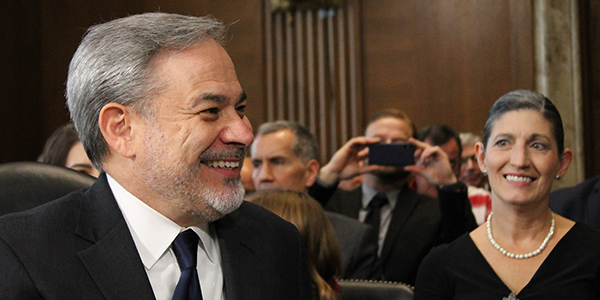By Michael Brooks
WASHINGTON — Deputy Energy Secretary Dan Brouillette appeared well on his way to taking over for his outgoing boss after facing little substantive questioning at his confirmation hearing Thursday and little, if any, opposition from Democrats.
Much of the hearing was taken up by members of the Senate Energy and Natural Resources Committee, on both sides of the dais, extolling the virtues of a particular technology and cordially asking Brouillette for his commitment and assurances that he would continue the Department of Energy’s work in advancing the research and commercialization of those technologies, including LNG, carbon capture and sequestration, battery storage, and advanced nuclear energy.
Brouillette has been serving as deputy to Energy Secretary Rick Perry since August 2017, when the Senate confirmed him 79-17. He was considered by the committee in May of that year alongside eventual FERC Chairman Neil Chatterjee and former Commissioner Robert Powelson. (See No Fireworks for FERC Nominees at Senate Hearing.) Chatterjee was among those in a packed audience Thursday that included five National Laboratory directors and Brouillette’s nine children.
Brouillette previously worked at the department in the George W. Bush administration as assistant secretary for congressional and intergovernmental affairs from 2001 to 2003. He worked as staff director for the House Energy and Commerce Committee for a year after leaving the department. Before returning to DOE, he had been a senior vice president for USAA since 2006.
President Trump formally nominated Brouillette on Nov. 7. Calling him “the obvious choice to replace Secretary Perry,” Senate ENR Committee Chair Lisa Murkowski (R-Alaska) told Brouillette it was her “intention to try and move you through the committee process just as rapidly as possible.” But regardless of if — or when — the Senate confirms him, Brouillette will take over leadership of the department, at least in an acting capacity, when Perry retires on Dec. 1.
Baseload and Resilience
Sen. Steve Daines (R-Mont.) said his state’s “balanced energy portfolio is coming under attack with the premature, forced closures” of two units at the coal-fired Colstrip plant because of “extreme, radical groups that litigate.” He told Brouillette he believed “that there is a role for you and the Department of Energy to play in order to maintain baseload supply in Montana” before asking him to “commit to working with me and this committee to protecting and growing baseload power like Colstrip and maintaining a secure and balanced energy portfolio.”
“It’s been the policy of this administration, and possibly the previous administration, to pursue an all-of-the-above energy strategy,” Brouillette replied. “In our view, diversity of energy supply means energy security, not only for our nation but for our allies across the world. … Until we are able to develop battery storage that has more capacity, is longer lasting [and] is perhaps more flexible in some respects, it is important that baseload power exist, because without it, if we are objective and candid, the introduction of renewables to our electric grid is very, very difficult.”
Through the department’s in-development North American Energy Resilience Model, “we’re going to look at these types of facilities and see if they fit that potential model and see if there’s anything that we should be concerned about potentially about the loss of those” plants, he said.
Asked by reporters after the hearing how he would go about saving baseload plants, Brouillette answered, “It’s not about saving the plants. It’s about working with regulators; showing them the things that we’re seeing; allowing the FERC to do its job.
“It’s not about simply ‘saving the plants.’ It’s about looking at the entirety of the grid, looking at the entirety of the energy sector and making sure that we have either distortions or artificial impacts on it that might preclude us from either adopting renewable technology or create some level of a security risk. … We’re looking at that resilience model as a way to show us in real time what’s happening on the grid.”
Ukraine Matters
The breezy hearing intersected briefly with the political firestorm taking place on the other side of Capitol Hill. Brouillette said he had no knowledge of or involvement in conversations with Ukrainian officials about matters at the heart of the House of Representatives’ inquiry into impeaching Trump.
“I have not been involved in any of the conversations that are related to the House’s inquiry,” Brouillette told ranking member Joe Manchin (D-W.Va.). He did say the department has worked with Ukraine, “at their request, to help them interconnect their electricity grid [and] their pipeline grid,” and that it has advised U.S. allies in Eastern Europe on building LNG import facilities as part of an effort to lessen their dependence on Russian natural gas.
Perry — along with U.S. Ambassador to the E.U. Gordon Sondland and Kurt Volker, special U.S. envoy to Ukraine — is one of the White House’s “three amigos” on Ukraine policy, according to Sondland. Perry had traveled to Ukraine in May for the inauguration of President Volodymyr Zelenskiy and provided him with a list of suggestions for the supervisory board of Naftogaz, the country’s state-owned energy company.
Sen. Ron Wyden (D-Ore.) asked if Brouillette was aware of “any contacts between Secretary Perry, or any other senior DOE officials, and representatives of Naftogaz.”
“I am aware that the secretary met on occasion with individuals who were asking for assistance with the restructuring” of the company, Brouillette replied. But he said he was not aware of any conversations between Perry and Trump’s personal lawyer, Rudy Giuliani, or anyone in the Ukrainian government about the makeup of the board.







